What's New
Displaying results 3001 - 3010 of 4052

Resource | Publications,
The people living with HIV (PLHIV) Stigma Index study in Tamil Nadu is the first of its kind to quantify the stigma and discrimination experienced by people living with HIV in the state. The study was conducted between December 2010 to September 2011.and used a cross sectional design to survey a sample of 1594 people living with HIV.
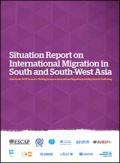
Resource | Publications,
As international migration has gained attention in the global agenda, calls for cooperation to manage international migration have increased. While international migration has acted as an engine for economic and social growth in South and South-West Asia, the full potential of migration has not yet been achieved. Desired outcomes from international migration are most likely to be achieved if countries of origin and destination build consensus and increase cooperation on international migration, including the realization of the rights of migrants within and beyond the region.
The Situation Report on International Migration in South and South-West Asia enhances the understanding of migration issues in South and South-West Asia by providing comprehensive reference material on international migration to assist policymakers and practitioners. The report contains sound policy recommendations on international migration in the subregion, and identifies gaps in knowledge to guide future data collection and research activities. The report serves as a companion document to the 2008 publication, Situation Report on International Migration in East and South-East Asia. Taken together, these two publications provide reference material on international migration covering most of Asia.
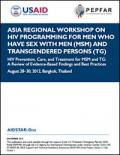
Resource | Publications,
The U.S. Government (USG) and U.S. President’s Emergency Plan for AIDS Relief (PEPFAR) have demonstrated a strong commitment to addressing the global HIV epidemic and to reaching most-at-risk populations (MARPs), also increasingly referred to as key populations. In order to successfully impact the epidemic of HIV among these populations, access to a comprehensive package of integrated services must be provided for men who have sex with men (MSM) and transgendered persons (TG). The act of Congress reauthorizing PEPFAR (July 2008) provides support for appropriate HIV education programs targeted to prevent HIV transmission among MSM as well as evaluation of the effectiveness of prevention efforts among MSM (Lantos and Hyde 2008).
To support these goals as part of PEPFAR’s comprehensive HIV prevention strategy, in May 2011, PEPFAR issued a Technical Guidance on Combination HIV Prevention document for MSM. This document responds directly to the urgent need to strengthen and expand HIV prevention for MSM and their partners and to improve the ability of MSM to access HIV care and treatment.
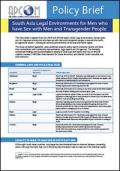
Resource | Publications,
This Policy Brief is adapted from the UNDP and APCOM report, titled ‘Legal environments, human rights and HIV responses among men who have sex with men and transgender people in Asia and the Pacific: An agenda for action’, covering 48 countries and territories of the Asia and Pacific region.
The study considered legislation, cases, published research, policy reports and press reports, and drew from consultations with community representatives, legal experts and UN agencies. The following summarizes findings and recommendations relating to South Asia with inputs from two of APCOM coalition members: INFOSEM (India Network for Sexual Minorities) and SAMAN (South Asia MSM and AIDS Network).
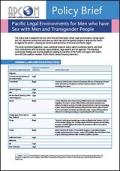
Resource | Publications,
This Policy Brief is adapted from the UNDP and APCOM report, titled ‘Legal environments, human rights and HIV responses among men who have sex with men and transgender people in Asia and the Pacific: An agenda for action’, covering 48 countries and territories of the Asia and Pacific region.
The study considered legislation, cases, published research, policy reports and press reports, and drew from consultations with community representatives, legal experts and UN agencies. The following summarizes findings and recommendations relating to countries of the Pacific sub-region with inputs from APCOM coalition member, PSDN (Pacific Sexual Diversity Network).
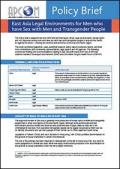
Resource | Publications,
This Policy Brief is adapted from the UNDP and APCOM report, titled ‘Legal environments, human rights and HIV responses among men who have sex with men and transgender people in Asia and the Pacific: An agenda for action’, covering 48 countries and territories of the Asia and Pacific region.
The study considered legislation, cases, published research, policy reports and press reports, and drew from consultations with community representatives, legal experts and UN agencies. The following summarizes findings and recommendations relating to countries of the Pacific sub-region with inputs from APCOM coalition member, PSDN (Pacific Sexual Diversity Network).
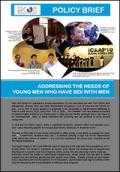
Resource | Publications,
In Asia and the Pacific region, there is significant economic variance within and between countries – each requiring specific and unique approaches, especially in response to HIV. The age at first male to male sexual encounter is often young, in the teens or younger for many men. Furthermore, receptive anal sex – a practice carrying a high risk of HIV transmission when performed without a condom – is a common experience for young men, including as the first sexual experience.
The region needs to find more effective ways to respond to the high and rising prevalence of HIV among MSM. The epidemic situations at country level require the development of programmes that respond to specific local circumstances where young men are practicing male to male sex.
Emphasis should be placed on peer-based programmes, where young men are able to shape programmes and services addressing their specific local needs. Greater political will and leader-ship is required to remove the barriers of criminalisation, discrimination and stigma currently inhibiting the resourcing and implementation of effective local programs.

Resource | Presentations,
Presentation on Counterfeit confusion: Is Intellectual Property enforcement the solution for dealing with fake or substandard drugs? at Regional Consultation and Planning Workshop “Use of TRIPS Flexibilities to Access Affordable ARVs in Asia” Bangkok 29-31 May 2012

Resource | Presentations,
Presentation on Criteria for patentability: a public health perspective at Regional Consultation and Planning Workshop “Use of TRIPS Flexibilities to Access Affordable ARVs in Asia” Bangkok 29-31 May 2012






